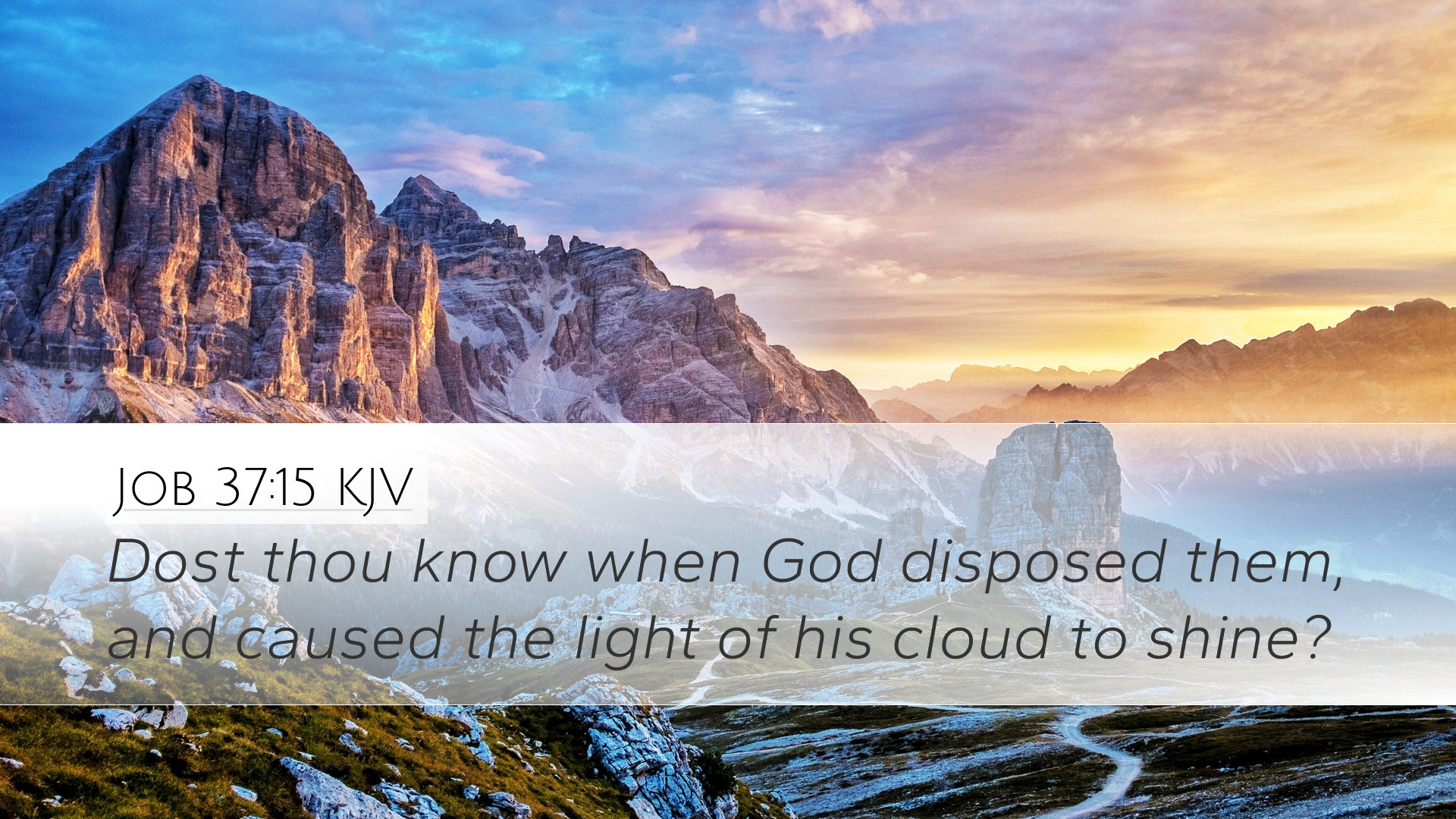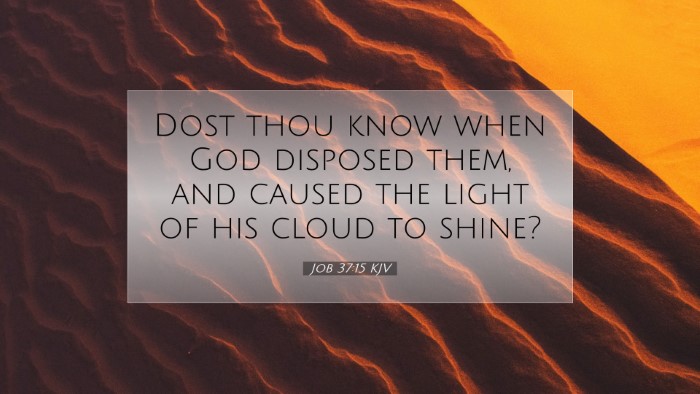Old Testament
Genesis Exodus Leviticus Numbers Deuteronomy Joshua Judges Ruth 1 Samuel 2 Samuel 1 Kings 2 Kings 1 Chronicles 2 Chronicles Ezra Nehemiah Esther Job Psalms Proverbs Ecclesiastes Song of Solomon Isaiah Jeremiah Lamentations Ezekiel Daniel Hosea Joel Amos Obadiah Jonah Micah Nahum Habakkuk Zephaniah Haggai Zechariah MalachiJob 37:15
Job 37:15 KJV
Dost thou know when God disposed them, and caused the light of his cloud to shine?
Job 37:15 Bible Commentary
Commentary on Job 37:15
Job 37:15 states: "Do you know when God lays his commands upon them, and causes the lightning of his clouds to shine?" This verse, set within God's discourse about His power and sovereignty, captures several themes of divine majesty, the natural order, and human comprehension. The insights from various public domain commentaries will help unpack the layers of meaning inherent in this verse.
Divine Sovereignty and the Natural World
Matthew Henry emphasizes that this verse reflects God's absolute control over the forces of nature. He notes that even the minutest details, such as the commands to the clouds, are under divine governance. The power of God is exercised not only in the creation of the world but also in its continued operation. This highlights the theological concept that God is not distant but actively involved in His creation.
Adam Clarke expands this by pointing out that the 'lightning of His clouds' illustrates both the beauty and terror of God's might. Clarke asserts that lightning represents God's judgment as well as His grace, demonstrating how the divine will is manifested in the natural phenomena that humans encounter. It is a reminder of the balance between fear and reverence that believers should maintain towards God's majesty.
Human Understanding of Divine Actions
Furthermore, Albert Barnes raises the question of human knowledge in understanding God’s workings. Barnes posits that while God’s power is palpable in nature, the intricacies regarding why and how these phenomena occur often elude human understanding. This interrogative nature of the verse challenges the reader to examine their place in relation to God’s grandeur.
- Human Limitations: Barnes underlines the limitations of human intellect in grasping the full nature and purpose of God's commands, particularly as they relate to natural events like storms and lightning.
- Reverence for God: Acknowledging the greatness of God should lead to awe and submission rather than pride in our understanding.
Theological Reflections and Implications
In synthesizing these insights, it becomes clear that Job 37:15 serves as a poignant reminder for theologians and believers alike. It underscores the necessity of acknowledging God's comprehensive control over creation while recognizing our limited perspective.
Integration of Knowledge and Faith
The interplay between knowledge and faith is critical here. Much like Job’s experiences throughout the book, this verse invites both prayerful contemplation and intellectual inquiry. The understanding that God has commands and that He executes them through natural phenomena invites a deeper exploration into the relationship between the Creator and His creation.
Encouragement in Suffering
This verse can also offer encouragement in times of suffering and uncertainty. Knowing that God commands not only the physical elements of nature but also the circumstances of life grants believers a sense of peace and assurance. God's will, though sometimes inscrutable, is always executed with divine wisdom and purpose.
Call to Worship
Ultimately, Job 37:15 calls the faithful to worship. Recognizing the author of the lightning—the representation of both power and beauty—should elicit a response of awe, reverence, and praise. It invites a posture of humility before the divine mystery of God's work in the world.
Conclusion
In drawing together the insights from Henry, Clarke, and Barnes, we see a multifaceted understanding of Job 37:15. It encapsulates the awe of divine sovereignty in nature, the limitations of human understanding, and the truth that such recognition ought to lead us into deeper worship. As we reflect on this verse, may we embrace both the challenges and comforts it presents as we engage with the God who commands creation.


